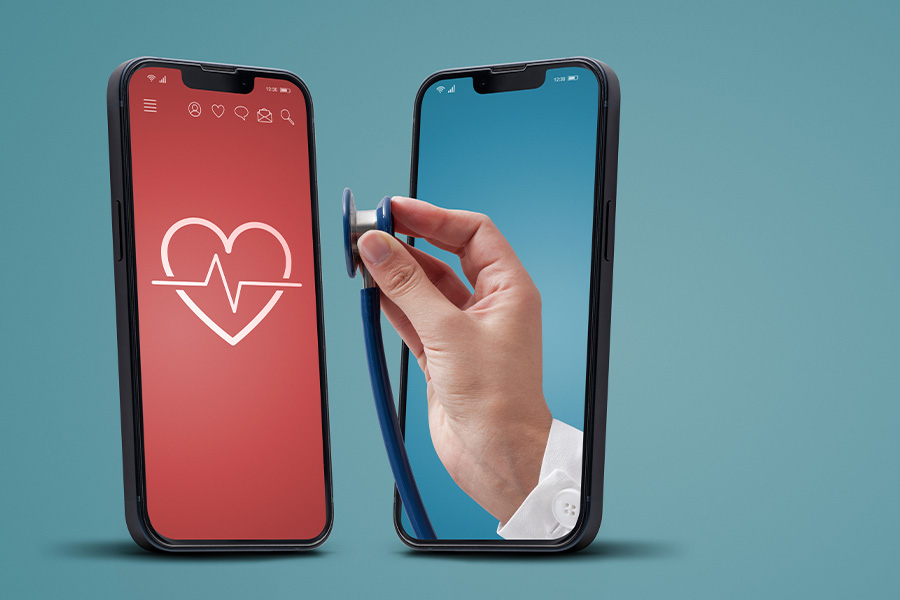CHINA
Online healthcare entered a period of rapid development during the pandemic. The advance of digital technologies such as big data, cloud storage and artificial intelligence has greatly changed the provision of medical and health products and services, accelerating the transformation of medical consultations and drug purchases. Online medical enterprises are also gradually foraying into healthcare and medicine integration.
In 2022, the Detailed Rules on Supervision of Internet-based Diagnosis and Treatment (for Trial Implementation) and the Measures for the Supervision and Administration of Internet-based Drug Sales formulated management regulations for online diagnosis and treatment, and pharmaceutical e-commerce from two dimensions: healthcare and medicine. This article summarises key points and challenges in online diagnosis and treatment, and pharmaceutical e-commerce.
OVERVIEW

Partner
Jingtian & Gongcheng in Beijing
Tel: +86 10 5809 1189
Email: lang.yuanpeng@jingtian.com
In recent years, China’s online diagnosis and treatment market has gradually integrated with pharmaceutical e-commerce, forming a closed ecosystem providing one-stop medical services. Online diagnosis and treatment mainly include consultation platforms set up by internet companies, and internet hospital platforms set up by hospitals or third parties relying on physical hospitals, such as the consultation platform Ping An Health and internet hospital platforms of New Century Healthcare. Internet hospitals are further subdivided into those serving as the secondary name of physical medical institutions and those independently set up by relying on physical medical institutions.
As a core monetisation model of the internet-based healthcare industry, pharmaceutical e-commerce mainly includes online healthcare models such as JD Health and Ali Health, and digital pharmacies like Dingdang Health, which provide an instant home delivery service by adopting online purchases and offline delivery. Taking the latter as an example, the Dingdang Medicine Express App has formed a closed-loop business model through its own offline pharmacies, direct drug supply from pharmaceutical companies and self-built distribution teams, supported by integrated online diagnosis and treatment, medication guidance and chronic disease management services provided by internet hospitals and medical teams.
KEY SUPERVISION
Although China’s internet infrastructure is relatively impeccable, regulations over online diagnosis and treatment, and pharmaceutical e-commerce, are still prudent, especially at this developing stage.

Partner
Jingtian & Gongcheng in Beijing
Tel: +86 10 5809 1150
Email: zhang.lu@jingtian.com
Business qualification. Online medical institutions should obtain the practising licence of medical institutions, as well as the electronic data interchange or internet content provider licence (granted by the relevant competent telecommunications bureau), depending on their specific business and service models. Generally, if internet hospitals only provide diagnosis and treatment services for the physical hospitals they rely on, it may be understood as an expansion of sales channels, rather than value-added telecoms services. Pharmaceutical e-commerce companies need to obtain the value-added telecoms business permit and internet drug information service qualification certificate, while drug marketing licence holders or operating companies that have obtained a business licence can carry out online pharmaceutical sales business.
Obligations. According to the above-mentioned measures, a pharmaceutical e-commerce platform company, as a “platform manager”, should: set up a drug quality and safety management body; establish and implement a drug quality and safety management system; be equipped with pharmacy technicians; and file with the local provincial medical products administration pursuant to relevant laws and regulations.
The company should also strengthen its inspection to manage drug information display, prescription review, drug sales and deliveries from companies listed on the platform, while urging such companies to strictly perform their legal obligations. In case of discovering any unqualified sale of drugs or other serious violations, the platform manager should immediately stop providing services and displaying drug-related information.
Pharmaceutical retailers must also comply with regulatory requirements, including prescription management, rule system construction, information reporting, information publicity, delivery quality and safety assurance, record tracing, drug quality and safety prevention and control.

Associate
Jingtian & Gongcheng in Beijing
Email: shi.qing@jingtian.com
Online medical treatment is allowed only for subsequent diagnosis. The above-mentioned measures establish the rule of “prohibition of online diagnosis first”. Detailed rules further require that patients should provide medical records with a definite diagnosis, and such a judgment should be made on whether the records meet the conditions for subsequent diagnosis. When the patient’s condition is not suitable for online diagnosis and treatment, the attending physician should immediately terminate diagnosis and treatment, and guide the patient to the physical medical institution for proper diagnosis.
Physicians and patients should abide by real-name registration system. Physicians should be certified by their real names before making a diagnosis. Other persons, artificial intelligence and such should not pretend to be or take the place of physicians to provide diagnosis and treatment services. Patients are obliged to provide true identification and basic information to medical institutions and should not pretend to be others for treatment.
Traceable online diagnosis and treatment process. Online medical institutions should ensure the whole process of diagnosis and treatment can be traced, and the data is accessible to the provincial regulatory platform. Electronic medical records at online medical institutions should be consistent with those at physical institutions they rely on – in the same format and shared in the system – so that physical medical institutions are able to carry out online and offline integrated quality control.
Stricter regulation on online sales of prescription drugs. The principle of online and offline integration should be adhered to.
- Prescriptions of online medical institutions should be made by attending physicians, and it is strictly forbidden to use artificial intelligence to automatically generate prescriptions. Effective measures should be taken to avoid repeated use of prescriptions.
- At the level of drug information display and sales management, the requirements of “prescription before medicine” and “prescription review” are emphasised, such as distinguishing prescription drugs from non-prescription drugs, and not showing drug instructions before prescription review.
- Clarifying responsibilities of the pharmaceutical e-commerce platform and retail companies. For example, the platform should be equipped with pharmacy technicians with management systems in place, such as prescription review and real name purchase of prescription drugs.
NEW OPPORTUNITIES
Recently, on 15 December 2022, the National Development and Reform Commission issued the Implementation Plan for the Domestic Demand Expansion Strategy for the 14th Five-Year Plan, proposing to actively develop “internet plus healthcare” services, along with orderly promotion of developing services such as scheduled diagnosis and treatment, electronic prescription circulation, and online drug sales.
Therefore, eligible online medical services can be included in medical insurance in accordance with the procedures. Although this shot in the arm has ushered in a historic opportunity for development of the online healthcare sector, more supporting policies are required to realise the full benefits of these policies. These notably include platform system security, and medical and health data standards.
For example, in the medical field, technological change and innovation will be more long-term and prudent. With the gradual deepening integration of digital technologies such as cloud computing, big data, the internet of things, artificial intelligence, mobile internet and medical care, the management and application of health data and medical information security will be a top priority.
In addition to abiding by general laws and regulations such as the Cybersecurity Law, Data Security Law and Personal Information Protection Law, companies involved in online diagnosis and treatment, and pharmaceutical e-commerce, should also pay attention to special requirements of the industry. For example, online diagnosis and treatment institutions should establish network and data security systems, personal information and privacy protection, and implement strictest information security protection at level three or above in line with protecting against any damage that could result in serious harm to social order and public interest, or harm national security.
At the same time, companies should promptly report to relevant competent authorities and take effective measures when any security incidents occur, such as leakage of patients’ personal information and medical data.
Pharmaceutical e-commerce platforms and retail companies should also take effective measures to ensure the authenticity, accuracy, integrity and traceability of drug information throughout the transaction process. The platform should keep information such as drug displays, transaction records and complaints for at least five years, and not less than a year after the drug expiration date. Under stricter regulatory policies, higher service requirements and new challenges are posed for relevant enterprises in the process of moving from in-hospital to out-of-hospital, and from modularisation to integration.

34/F, Tower 3, China Central Place
77 Jianguo Road, Chaoyang District
Beijing 100025, China
Tel: +86 10 5809 1000
Email: jingtianbj@jingtian.com
INDIA
Intellectual property (IP) and intellectual capital (IC) drive companies to create jobs and market advantages, as well as propel innovation. Proper protection of IP rights for the ability to monetise and enforce eventual successful valuation are key goals in India.
With multiple IPs combined, brands can create a world of their own, attracting customers to join a developed and advanced ecosystem. This has triggered a trend of uniqueness, layering IP on multiple levels. But not all IP can be protected statutorily, and much has to be protected strategically. In this article, the author explores prevalent IP issues that impact and enable the country’s competitive healthtech sector.
E-PHARMACIES
With the advent of technology, the e-retail business has surged and is expected to grow quickly. Markets N Research predicts the global e-pharma industry will grow nearly three-fold from USD50.5 billion in 2021 to USD142.7 billion by 2028. Among the major players, India is the Asia-Pacific’s fastest growing market. Lower prices, doorstep services, around-the-clock availability and easy accessibility are major contributors to the rise of the e-pharma industry.

Senior Partner and Head of Trademarks, Contractual and Commercial IP
Anand and Anand in New Delhi
Tel: +91 120 405 9300
Email: safir@anandandanand.com
The Federation of Indian Chambers of Commerce and Industry notes many startups entering the e-pharmacy space. During the pandemic, e-pharmacy was one of the few performing businesses, with 50-60% growth in overall gross merchandise value. Clearly, the sector has huge potential to attract foreign direct investment.
The sale of drugs via e-pharmacies falls under the purview of the Drugs and Cosmetics Act, 1940, and the Information Technology Act, 2000. But the Drugs and Cosmetics Act doesn’t distinguish between online and offline pharmacies. Hence, to date, India has no specific legislation or rules to regulate the e-pharmacy industry, with the exception of the Ministry of Health and Family Welfare’s Draft Rules to Regulate the Sale of Drugs through E-pharmacy, approved with the introduction of the Draft Drugs and Cosmetics (Amendment) Rules, 2018, providing sector-specific e-commerce regulations. These draft rules mandate that all e-pharmacy holders be registered with the Central Drugs Standard Control Organisation, the country’s apex drug regulator and central licensing authority. Once notified, these rules shall regulate e-pharmacies to obtain their licences in the prescribed manner, apart from laying down the procedure for the distribution or sale of drugs through e-pharmacies. The licences issued will remain valid for three years and registration can be renewed.
TELEMEDICINE GUIDELINES
The government published the Telemedicine Practice Guidelines in 2020 to legalise virtual consultations by professionals. This was a welcome move, especially during the health crisis, assuring steady medical services. The guidelines, formulated by the public policy thinktank NITI Aayog, were notified under the Indian Medical Council (Professional Conduct, Etiquette, and Ethics Regulation, 2002) and issued by the Ministry of Health and Family Welfare. Salient features include:
- Only registered medical practitioners (RMPs) are entitled to provide telemedicine consultations;
- RMPs are allowed to use text, video or audio-enabled solutions for consultations;
- Onus is on the doctor to decide whether teleconsultation will suffice, or if in-person review is needed, based on the complexity of the patient’s situation;
- RMPs have to verify the patient’s identity by name, age, address, email, phone number, registered identification, or other manner;
- RMPs need to be sure about the patient’s age before prescribing any medication. The practitioner can ask for the patient’s proof of age if in doubt;
- If the patient initiates the telemedicine consultation, their consent is implied;
- If a physical examination is critical information for consultation, RMPs should not proceed until a physical examination can be arranged;
- All RMPs are to complete a mandatory course within three years of the release of the guidelines;
- Certain drugs listed cannot be prescribed through telemedicine; and
- Doctors must follow existing ethics and confidentiality regulations under the Indian Medical Council Regulations, Information Technology Act, and any future data protection and privacy laws. The Personal Data Protection Bill treats health data as sensitive personal data and places restrictions on its movement and use.
MEDIARIES OR NEMESIS?
Counterfeiting is prevalent but the world of pharmaceuticals is among the most struck by it. One effective anti-counterfeiting play would be making the intermediary liable, targeting suppliers of counterfeit products. But counterfeiters often act through third parties that are perhaps unaware their services are used for illegal activities. Such third-party engagement renders the liability of intermediaries a cutting-edge matter in IP law worldwide. Intermediaries may include both principal groups: online (i.e., e-commerce websites) and offline intermediaries.
In 2019, the Department for Promotion of Industry and Internal Trade released a new draft e-commerce policy proposing data localisation and streamlining of the operations of e-commerce companies in line with the US Food and Drug Administration rules and local regulations. This was an anti-counterfeiting measure. At that time, several e-commerce companies such as Flipkart and Amazon raised concerns over the guidelines, and the department has since circulated a 2022 draft of the policy among government departments and concerned ministries.
DATA PROTECTION
The Information Technology Act, 2000, was unable to keep up with technology advancement. Data protection has become more complicated as the number of devices to monitor and protect expands daily.
But India does not have any specific legislation for data protection. Data breaches result mostly from inadequate data protection measures. Amazon’s Alexa feature of listening to conversations, and Google accessing the healthcare information of millions of people, have raised public alarm.
Since the EU’s General Data Protection Regulation, 2018, was enforced, India’s Digital Personal Data Protection Bill, 2022, has finally been tabled in parliament, prescribing compliance requirements for all forms of personal data, broadens individual rights, introduces a central data protection regulator, and institutes data localisation requirements for certain forms of sensitive data.
THE BRAND
In addition to trade name protection for a brand, protection can be availed for packaging, labels, logos, get-up (the appearance of goods and their packaging), layout and combinations of colours of pharmaceutical products. Also, unique tablet designs can be registered as 3D trademarks, for instance, in the shape of an alphabet letter, distinct colour combination and specific numerals, or distinctive shapes of containers, bottles and kits. The Trade Marks Act, 1999, provides specific provisions for the prohibition of the registration of names of chemical elements or international non-proprietary names.
COPYRIGHT
For the protection of various aspects of pharmaceutical products, the following can be protected under copyright:
- Packaging, labels, get-up, layout, colour schemes of the pharmaceutical products;
- Advertisement text and graphics as published in a particular journal, article, medical book, or anywhere else; and
- Any literary work regarding efficacy, general precautions, side effects or important safety information.
PATENTS
India only recognised process patents for inventions relating to food, drugs and chemicals until the product patent regime was introduced in 2005. Now it is imperative for pharmaceutical companies to protect their inventions from any unauthorised commercial use by acquiring patent rights on the invented product or process.
Pharmaceutical patents can be classified under the categories of new chemical entities, formulations or compositions, synergistic combinations, new forms of known substances, kits, product-by-process; and process or method of manufacturing. However, the process for medicinal, surgical, curative, diagnostic, therapeutic or other treatment of humans or animals is not patentable under the act.
DOMAIN NAMES
Apart from listing products on official websites, several companies operate product-specific websites for their flagship products, dispersing product-related information, manner of use, general precautions, side effects, or important safety information.
As domain names serve the purpose of source identifier, they are treated as equivalent to trademarks in India. Hence, domain name registrations confer the companies with proprietary rights over the mark.
WELL-KNOWN MARKS
A petition or application for declaring a mark as well-known may be filed under the amended Trademarks Rules, 2017. Earlier, there was uncertainty around the process and timelines, but now a committee decides such applications and the process is more streamlined.
Indian courts have on several occasions also observed that goods associated with a trademark do not have to be in the market for a certain number of years to acquire distinctiveness. A trademark can acquire distinctiveness overnight, so adjudication is on a case-by-case basis. Hence, pharma brands acquiring substantial market share as popular, famous and well-known are eligible for the process.
CUSTOMS REGISTRATION
The law allows holders of specific IP rights – including trademarks, copyright, patents, designs and geographical indications – to record their rights with Indian customs for the seizure of counterfeit goods at port.
Import of branded goods is notified to the respective rights holder and if the goods are found to be counterfeit they are seized, with a heavy penalty imposed on all parties facilitating the import. The seized counterfeit goods are ultimately destroyed under the rights holder’s supervision.

Anand and Anand
B-41, Nizamuddin East,
New Delhi 110013, India
Contact details:
Tel: +91 120 405 9300
JAPAN
From first-hand experience of fraud investigations for pharmaceutical and medical device manufacturers operating in Japan, the authors highlight legal issues specific to healthcare companies that often arise, with precautionary advice for conducting such sensitive enquiries.
INVESTIGATION PRECAUTIONS
Investigating company emails does not require employee consent. Conducting fraud investigations in Japan often includes employees’ emails and other forensic investigations. If the fraud investigation is justifiable based on reasonable suspicion, the company’s investigation team will access the company’s email account or other information stored in electronic media, such as computers and mobile phones lent by the company, without consent from the employees.
However, consent is necessary to access electronic media owned by the employee and the employee’s personal email.

Representative Partner
GI&T Law Office in Tokyo
Tel: +81 3 6206 3285
Email: kengo.nishigaki@giandt-law.com
Attorney-client privilege. Since there is no pre-trial discovery system in Japanese litigation, where parties exchange information on evidence to be presented in court, the concept of attorney-client privilege does not exist. Attorney-client privilege refers to a legal doctrine that protects confidential communications between an attorney and their client. However, in the event of a bribery case investigated at a Japanese subsidiary of an American company, application of the Foreign Corrupt Practices Act will be a problem in the US, so the results of fraud investigations in Japan will be subject to attorney-client privilege under US law.
To secure attorney-client privilege, it has become common in recent years for an “Upjohn warning” – a notice that the lawyer represents the company but not the employee individually – to be issued when interviewing employees of a Japanese subsidiary of a US company. In this case, it is necessary to explain the unfamiliar matter of the attribution of attorney-client confidentiality privilege in a simple and easy to understand manner to all involved parties, without arousing unnecessary caution.
Difficulty in dismissing employees. Since Japan’s labour law is based on the premise of long-term employment, there are very limited cases in which dismissal can be made under judicial precedent. Therefore, even if an investigation finds that an employee of a Japanese subsidiary of a European or US company has committed a certain amount of fraud, it is often difficult to dismiss the employee under Japanese law.
In many cases, minor violations of the Pharmaceutical and Medical Device Act and industry rules do not constitute grounds for dismissal. In such cases, it is necessary to respond by taking disciplinary action, including dismissal or demotion, in accordance with the employment rules.
OFF-LABEL PROMOTIONS
Off-label promotions are regulated under the Pharmaceuticals and Medical Devices Law. In the event of an exaggerated advertisement, or advertisement of the product’s efficacy and effects that have not been approved under the law, the violator shall be ordered to rescind the illegal advertisement and also pay a 4.5% levy on sales of the product during the violation period.

Counsel
GI&T Law Office in Tokyo
Tel: +81 3 6206 3283
Email: andrew.griffin@giandt-law.com
Restrictions on off-label promotion have been relatively lenient in the past. In 2013, Novartis conducted a large-scale doctor-led study in Japan on the blood pressure lowering drug Diovan at five university hospitals and sent its own employee as researcher, who was accused of falsifying data and publishing research papers in favour of the company claiming the drug was effective not only for hypertension but also cardiovascular complications. Based on this, Diovan reportedly recorded a total of JPY1 trillion in accumulative sales since it was made available in Japan in 2000.
The case developed into a criminal case, but in 2021 the Supreme Court of Japan ruled that the employees and Novartis were not guilty of tampering with data, and the research paper did not fall under the category of advertisement under the Pharmaceuticals and Medical Devices Law.
In response to this incident, the Ministry of Health, Labour and Welfare began to tighten off-label promotion regulations and introduced the above-mentioned levy system by amending the Pharmaceuticals and Medical Devices Act (enforced on 1 August 2021), and issued the Guidelines for Provision of Sales Information on Prescription Drugs (Guidelines for Provision of Sales Information), as well as establishing a system to prevent off-label promotion by pharmaceutical companies.
The ministry also established a system to obtain information on suspicious advertising activities by pharmaceutical companies from medical institutions by launching the Advertising Activity Monitoring Project.
To decide whether a product falls under the category of off-label or not, it is necessary to see if the advertising activity falls outside the scope of regulatory approval, but this requires medical and scientific consideration, and the content of regulatory approval itself is often unclear.
In addition, the Guidelines for Provision of Sales Information do not prohibit sales representatives from providing off-label information at the request of medical professionals, but prohibit the unsolicited provision of information. Therefore, it may be necessary to investigate whether there was a request for information from medical professionals.
DATA PROTECTION

Associate
GI&T Law Office in Tokyo
Tel: +81 3 6206 3927
Email: yuji.yamamoto@giandt-law.com
Japan has received an adequacy decision under the EU’s General Data Protection Regulation (GDPR), which means the country has an adequate level of data protection outside the EU, and strictly protects personal information based on the country’s Act on the Protection of Personal Information (APPI).
Patient information is regarded as sensitive personal information, and its acquisition and provision to third parties are strictly regulated. Healthcare companies may receive patient data for clinical trials, clinical studies and services to healthcare institutions. As promulgated in the APPI, the acquisition and provision of personal data to a third party based on the consent of the data subject are relatively widely accepted.
Unlike the GDPR, consent in the APPI is not limited to explicit consent but also includes implicit consent. However, when a healthcare company obtains a patient’s personal information from a medical institution for promotional purposes, it is unlikely that the patient will “implicitly consent” to provide their information for promotional purposes.
Therefore, if a medical institution or healthcare company has not obtained explicit consent, the acquisition or transfer of such information is likely to violate the APPI. Healthcare companies should therefore exercise caution when conducting post-marketing surveillance for commercial purposes.
On the other hand, the latest amendment of the APPI, in 2022, recognises the concept of pseudonymised information, which means information relating to a particular individual that has been processed by replacing all or part of the identifiers in such a manner that the individual is no longer identifiable unless it is collated with other information. This paved the way for medical institutions to remove patients’ personally identifiable information from their personal information, and then jointly use it for collaborative research with healthcare companies.
However, it should be noted that this may conflict with ethical guidelines for medical and biological research involving human subjects issued by the government.
ANTITRUST LAW
Japan’s antitrust laws, similar to the EU, UK and US, broadly regulate vertical restrictions (including resale price maintenance and tying) and horizontal restrictions (including cartels). Since the healthcare industry manufactures and sells highly unique prescription drugs and medical devices, there are few cases where horizontal restrictions become a problem, although a large-scale cartel was uncovered in 2021 regarding the wholesale trade of pharmaceuticals.
With regard to vertical restrictions, to prevent resale price maintenance, pharmaceutical and medical device manufacturers have conducted in-house training to ensure that sales representatives do not engage in resale price maintenance actions against wholesalers. In particular, it should be noted that rebates paid by pharmaceutical companies to wholesalers may be used as a means of maintaining resale prices.
When medical equipment manufacturers sell medical equipment and consumables, it is common to have a business model in which profits are obtained from the continuing sales of consumables. As such, the problem of predatory pricing arises when medical equipment is sold at significantly lower prices. In addition, the provision of equipment and medical equipment below fair market price may also violate the Fair Competition Code.
The authors explained anti-bribery laws and industry codes in Japan’s healthcare sector in Asia Business Law Journal’s September/October 2022 issue.

GI&T LAW OFFICE
8/F Shin-Yurakucho Building
1-12-1 Yurakucho, Chiyoda-ku
Tokyo – 100-0006, Japan
Tel: +81 3 6206 3283




























